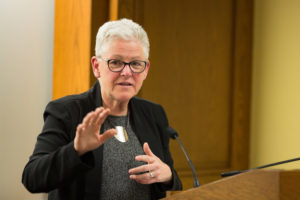
The White House plans chemical regulations and authorizes refugee admissions, FDA approves boosters, and more…
IN THE NEWS
- The Biden Administration announced a plan to protect against the harmful effects of per- and polyfluoroalkyl substances, commonly used chemicals known as “forever chemicals,” because they remain in the environment and can cause severe health problems once released. Eight agencies are involved in the plan, which outlines both prevention and cleanup efforts. The U.S. Environmental Protection Agency’s roadmap designates these forever chemicals as hazardous substances, increases research and review of past actions, and sets timelines to determine limits for drinking water and industrial uses. President of the Environmental Working Group, Ken Cook, called the actions “significant” but noted that they “are just the first of many actions needed to protect” the public from these chemicals.
- The Biden Administration authorized the admission of 125,000 refugees to the United States for the 2022 fiscal year. The Administration allocated refugee entry for regions of “special humanitarian concern,” allowing 40,000 individuals entry from Africa, 35,000 from Near East and South Asia, 15,000 from Latin America and the Caribbean, 15,000 from East Asia, and 10,000 from Europe and Central Asia. The Biden Administration left 10,000 spots unallocated for use as needed. In addition, the Biden Administration may transfer unused spots from one region to another region where refugees are in greater need for asylum. The Biden Administration specifically identified individuals from Cuba, Eurasia and the Baltics, Iraq, El Salvador, Guatemala, and Honduras, along with individuals from any U.S. Embassy, as qualifying as refugees.
- The U.S. Food and Drug Administration (FDA) approved single-dose booster shots of the Moderna, Pfizer, and Johnson & Johnson COVID-19 vaccines for individuals aged 18 to 64 who are at high risk for severe complications from COVID-19, for individuals who are frequently exposed to COVID-19 pathogens, and for all individuals over 65 years old. FDA also approved a “mix and match” strategy, which allows vaccinated individuals to receive a booster shot from any of the companies regardless of the brand of vaccine they had previously received. FDA indicated that qualifying individuals may receive a booster shot six months after their second dose of the Moderna or Pfizer vaccine, or two months after receiving the first dose of the Johnson & Johnson vaccine.
- The U.S. Department of the Treasury, in a joint statement with Austria, France, Italy, Spain, and the United Kingdom, announced it would no longer impose retaliatory tariffs on these five countries for their use of taxes on company revenues from digital services that would impact large U.S. tech companies. Countries impose these taxes, known as digital services taxes, on companies that provide digital services to consumers in that country. Digital services taxes collected by the countries issuing the statement will be credited against future income taxes ahead of a multinational tax agreement that will go into effect in 2023. U.S. trade representative Katherine Tai said the United States would “continue to oppose the implementation of unilateral digital services taxes.”
- The U.S. Department of Justice filed a brief asking the U.S. Supreme Court to halt the implementation of Texas’s new abortion law. The law prohibits abortion as soon as there is a “steady and repetitive rhythmic contraction” fetal heartbeat, which can occur as early as six weeks into a pregnancy. The law also has an enforcement mechanism that allows private actors to bring suit. The Justice Department’s brief also asked the Court to hear the challenge to the law in the current term rather than waiting for the appellate court to first rule on the case.
- White House assistant press secretary Kevin Munoz announced that, starting November 8, 2021, the United States will allow fully vaccinated individuals entry into the country, reducing the restrictions on international visitors intended to prevent transmission of COVID-19. The eased restrictions will apply to travelers entering the United States by land or by air. Munoz stated that the decision to ease travel restrictions was “guided by public health” considerations.
- FDA issued a proposed rule allowing a new class of over-the-counter hearing aids to be sold directly to consumers without a prescription or medical exam. According to FDA, only about 20 percent of the nearly 40 million people who suffer from hearing loss use hearing aids. The new rule aims to improve access to hearing aids and to reduce the cost to consumers. The rule also attempts to improve competition in the hearing aid market following President Joseph R. Biden’s executive order encouraging competition and calling on FDA to promote access to hearing aids.
- The South African Health Products Regulatory Authority announced that it would not approve the Sputnik-V COVID-19 vaccine for use. The vaccine, which is made by Russia, uses a virus known to increase the risk of HIV in men. The regulatory authority explained that the makers of Sputnik-V were not able to demonstrate the safety of the vaccine in places with high rates of HIV prevalence. The European Union drug regulator, the European Medicines Agency, has also reportedly said it would not likely approve the vaccine this year.
WHAT WE’RE READING THIS WEEK
- In a report for the Center for American Progress, Todd Phillips, director of financial regulation and corporate governance, discussed how the U.S. Securities and Exchange Commission (SEC) could address the harm resulting from the lack of regulation in digital asset markets. Phillips explained that digital assets—namely, cryptocurrencies—operate through an anonymous, but documented, system called a blockchain. Phillips noted that digital assets are susceptible to manipulation, deception, and theft because blockchains are anonymous. Moreover, the value of cryptocurrencies is largely speculative, which increases their investment riskiness. Phillips posited that the SEC should regulate cryptocurrencies like traditional securities, despite their difference in form, to reduce the use of cryptocurrency in illicit activities such as money laundering. Phillips concluded that the U.S. Congress should direct funds toward regulating digital asset markets.
- In a report issued by the Tax Policy Center, David C. John, deputy director of the Retirement Security Project at the Brookings Institution and his coauthors, discussed managing the issues presented by small and inactive retirement accounts. John and his coauthors identified some of the main problems posed by small and inactive accounts: administrative costs and fees; account withdrawals prior to the owner reaching retirement age; and lost accounts. John and his coauthors offered possible solutions to these problems, including making it easier for account owners to consolidate their accounts. John and his coauthors concluded that although their solutions may seem “technical,” they can help “provide savers with greater retirement security.”
- In a Brookings Institution report, Jinyan Zang, fellow at the Harvard Kennedy School, argued that regulators and other industry actors should take action to prevent racially discriminatory advertising on platforms such as Facebook. Zang found that advertising that targets people of certain races or ethnicities can be harmful because it exposes marginalized consumers to discriminatory advertising in important areas such as housing, employment, and credit. Zang also discovered that this type of advertising can accelerate the spread of misinformation. Zang urged policymakers to combat this discrimination by mandating that advertisers release their advertising targeting data, conduct audits of advertising bias, and require advertising algorithms to learn customer demographics.
FLASHBACK FRIDAY
- In an essay in The Regulatory Review, Robert M. Kaplan, professor at the UCLA Fielding School of Public Health, argued that new FDA drug approval processes in the 21st Century Cures Act “could increase risks to patients.” Kaplan noted how the act deemphasized certain methodologies for measuring drug safety, such as “the double-blind randomized clinical trial,” which Kaplan refers to as the “gold standard” for these kinds of assessments. Kaplan stated that loosening these kinds of standards may lead to insufficient awareness of pharmaceutical side effects from patients. Kaplan concluded that the Cures Act is working as intended by speeding up approval of new drugs, but that the act also deserves “continuing scrutiny” to see if the relaxed standards result in harm to patients.



